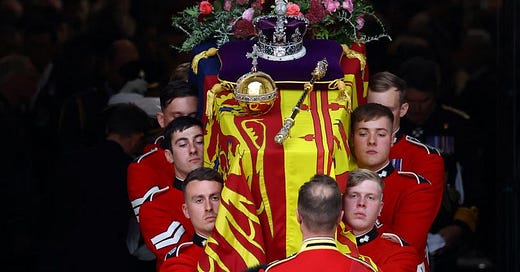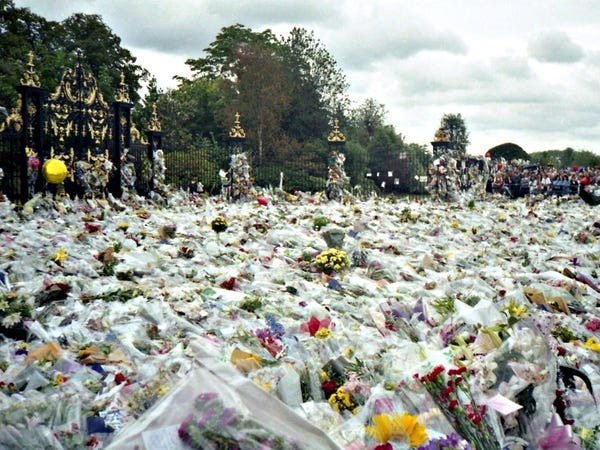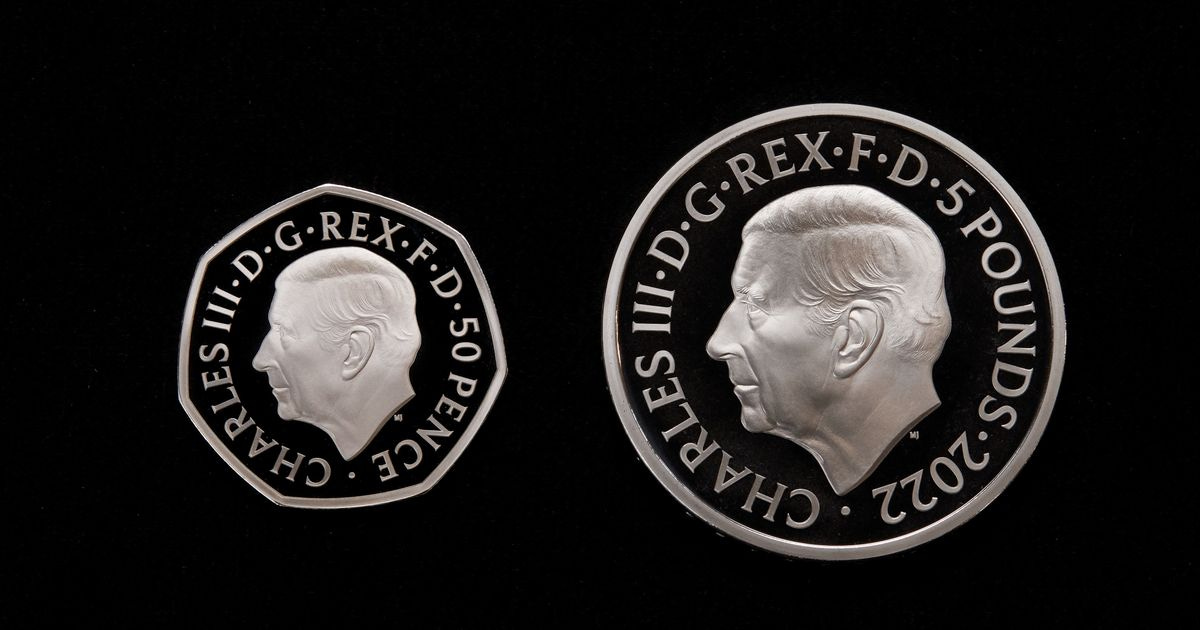The death of Queen Elizabeth II was more significant for our culture than most people realised. It was not the event that was unexpected, but the grief.
The Queen had been a pillar of godly virtue during a period of history in which western society has been brazenly eroding the moral foundations on which it was built - and on a quite unprecedented scale. Amidst all that was changing, many people did not realise the sheer difference she made simply by being there, by standing where she stood, by all that she did or did not say.
OTHERWORLDLY VALUES
Elizabeth’s 70-year reign saw a relentless volume of ideological shifts on what our society does or doesn’t call ‘good’. This makes it all the more incredible that she was able to hold the line in the public eye for so many years advocating a very different way of life which stood as a powerful counterpoint to all that swilled around her. As an insightful article by Sebastien Milbank put it at the time:
The monarchy has survived in a world that came to reject social hierarchy, deference, aristocracy, tradition and religion. With every force and sensibility turning away from it, the Queen still found ways to connect with ordinary people, to articulate a shared life, and mutely embodied in her conduct what our newly progressive nation no longer wished to hear explicitly articulated.
Far more than an empty signifier, or a maudlin symbol of unity…the Queen fully embraced a mode of life and a set of values utterly alien to modern Britons. Duty, religious piety, humility and service to her fellow man and woman. Like the Israelites bearing the Ark of the Covenant across the desert, our Queen has carried the hidden heart of British life within her through a secular and disenchanted age.
Indeed, the sense of honour that a god-fearing monarch still imbues in the average westerner can be quite striking. It doesn’t make all that much sense. Based on the individualism, consumerism, relativism, and radicalism that dominates our society, we simply ought not to care. If the average westerner were consistent with their functional worldview, it’s really just another dead celebrity. A tourist attraction.
And yet, inexplicably, we find that we do care. At least we did at the time. As Rhys Laverty has noted in relation to our ceremonial attachment to royalty: “Ceremony is utterly irrational, and yet utterly sensible.”
WHY WE CARED THE QUEEN WAS DEAD
It seemed to matter to us that the Queen was dead. It seemed to have significance beyond the norm. They cancelled football matches because of it; they referred to it as a moment when history stops. That moment ought not to have mattered as much as it did. But it did. It mattered not only because of who she was, and how she was, but what she was; the office she held, what it stood for, and all that it calls us to contemplate.
A CULTURAL WAKE-UP CALL
Moments of major national grief tend to act as strange reminders within our culture, lifting the lid on all the pretending we have been doing. For decades we have revelled as a society in self-serving individualistic “freedom”. We have been busily and brazenly unmooring ourselves from all that went before us, all that was built, all that was inherited. We have been mocking our heroes, demolishing our statues, desecrating our masterpieces, and mutilating the minds (and sometimes the bodies) of our children.
We have done so in the name of a mystical rage which shows little hope of being quenched, no matter how many cultural heirlooms are sacrificed to the new gods. We have revelled in our newfound lands of opinion, our discoveries of the impossible, the immoral, the ever-immediate. These enthusiasms have gone hand in hand with a terrifying disdain for the true, the good, and the permanent.
Whilst much of this cultural and ideological destructiveness has escalated dramatically in just a handful of recent years, we’ve really been on this trajectory for many decades. And all the while we’ve assumed there would be no major consequence for this idolatry of upheaval, as though the party of perpetual revolution could go on forever.
THE HAUNTING OF SACRED PURPOSE
The unexpected mourning of a godly Queen reminded us we were made not for consumeristic self-worship at the beckon call of whatever new idea presents itself to our hearts. It reminded us that we were instead made for a grand and glorious purpose to which our lives ought to be oriented. Such purpose stretches beyond the accumulated individuals of any single generation, however noisy. And in their strange way, even the imperfect monarchies of this world reflect the grandeur which represents that purpose.
They do so in the very essence of what they are supposed to stand for, even where they fail. They are shadows of the true kingdom beyond this world (John 18:36). This is ultimately the true kingdom which our late great Queen truly served, and which our new king will at least claim to serve. The coronation offers us another window into this kingdom, even if many no longer know why it matters, and why it ought to cost so much to stage.
As Ian Bradley, author of God Save the King: The Sacred Nature of the Monarchy (2023) noted, many have seen the coronation as
“the ceremonial occasion for the affirmation of the moral values by which the society lives. It was an act of national communion and an intensive contact with the sacred.”
If a nation constitutes a common bond between people based upon shared values, land, and laws, then the crowning of the symbolic figurehead for that nation becomes, in a sense, the symbolic embodiment of that nation’s morality.
It was easier to believe this was a good thing when the Queen was on the throne due to her example of Christian virtue. But even if the King does not follow in her wake, the “sacred” aura of his office will continue to haunt both him and the nation.
Bradley also refers to Jeremy Paxman’s book, On Royalty (2006), where it is asserted: “Monarchy is almost the last institution in the land to which any mystique attaches.” Indeed, in a secular society that increasingly bears witness to mystery only on a fictional level of entertainment, society’s obstinate love of royalty is a strangely disruptive force among those who wish to leave “the sacred” behind. Paxman even adds, “there is certainly an argument for saying that royalty can be properly understood only in religious terms.”
As much as the atheist might say this makes no difference if religion is nonsense anyway, their protestations make no difference to the ongoing thirst for the sacred in human societies, embodied most overtly in the public reception of a Christian royal system. There are very few thoroughgoing secularists who can live without the kind of grand mystery and meaning which such events as royal funerals and coronations evoke. Materialism does not do it. Many pretend it does; but they are, well, pretending.
LONG LIVE THE CHURCH?
Most of us alive today had not needed to think about the death of a monarch for most of our lifetimes. The loss of the Queen was palpable. She was always there, on our coins and banknotes, soothing our chaotic world with the distant but very real promise of permanence. But whether future generations will care about her successor is not clear.
A darkly illuminating BBC report, commenting on the public reception of Charles’ coronation, said: “Apathy about the event was claimed to be highest among young people, with 75% of 18 to 24-year-olds saying they were not interested in it.” This is troubling for what I hope are already obvious reasons. Younger generations ought to appreciate moments like this to remind them of all they are presently walking away from, of all that may one day be lost. This includes the loss of a national Church in any meaningful sense.
There will soon be a new head on the denarius, one who is also - perplexingly - a new head of the established Church. For non-Anglicans this might seem immaterial. Christ is the true head of the Church, and even the very notion of the established Church is especially prone to socio-political corruption. But pietistic Christian traditions (like my own) do not always realise the impact the established Church still has upon our freedom of worship within this society.
As Joe Boot argues in Ruler of Kings: Toward a Christian Vision of Government (2022), speaking of this connection between throne and altar:
“Despite its many faults, at least in this system the Church of England has been historically regarded as unique in society, functioning in the past as a conscience for the nation and could expect a certain amount of respect, protection, and recognition from civil government.”
Such recognitions and protections filter down to the free churches too, many of which have been sheltering behind the Anglican barricade for decades without knowing it. Indeed it often amazes me that the UK government still allows us to get away with practising Christianity at all. By the grace of God, that’s at least partially due to the fact we have an established Church and a Christian monarch, however woefully imperfect both now appear to be.
THE PRICE OF MONARCHIC APATHY
The Church cannot simply abandon the socio-political sphere and assume we can carry on church-planting, worship-singing, and evangelising as usual. It will not be neutral or apathetic. It will be busy opposing us and all we hold dear. As I argued in an article for the American Reformer, the effects of progressive infiltration tend to leak in over time, infiltrating the values of even the most staunchly faithful churches, denying us the ability to live out and speak out what we actually believe. No earthly institution can assume itself to be safe in and of itself.
Keep reading with a 7-day free trial
Subscribe to That Good Fight to keep reading this post and get 7 days of free access to the full post archives.







